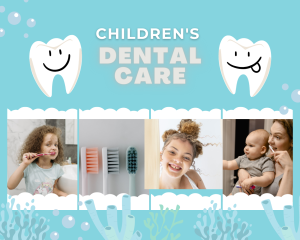Pediatric Dentistry – Importance and Frequently Asked Questions
As parents, we think of a lot of things when it comes to the health and well-being of our children. But oftentimes, dental care falls at the bottom of our priority list. It is a common misconception that dental health is not as important as other aspects of our children’s health. However, child dental care is crucial to our children’s overall health as it can impact their physical, mental and social well-being.
In this blog post, we will address some of the most frequently asked questions regarding pediatric dentistry, discuss the importance of dental care for our children, and provide actionable tips for parents to ensure their child’s dental health.
Frequently Asked Questions About Pediatric Dentistry
Q1. When should I start taking my child to the dentist?
A: A child should be taken to the dentist for their first visit by their first birthday or within six months after their first tooth erupts. This is an important time for the dentist to check for cavities, monitor growth and development, and provide education on oral hygiene. According to the American Academy of Pediatrics (AAP), early dental visits help in preventing dental problems and educating parents about proper oral care.
Q2. Should I be concerned about cavities in primary teeth?
A: Cavities in baby teeth can turn into more profound problems if left untreated. Cavities in primary teeth can lead to pain, infection, premature loss of baby teeth, improper speech development, and dental problems in adulthood. Moreover, pediatric dentistry experts confirm that primary teeth act as space maintainers for permanent teeth. If a primary tooth falls out too early, it might lead to overcrowding in the permanent teeth.
Q3. How can I prevent cavities in my child’s teeth?
A: Parents can prevent cavities by encouraging their child to brush their teeth twice a day with fluoridated toothpaste, floss daily, limit sugary snacks and drinks, and take their child for regular dental check-ups.
Q4. When should I start brushing my child’s teeth?
A: A child’s teeth should be brushed as soon as their first tooth erupts. Use a soft-bristled toothbrush and a small amount of fluoridated toothpaste, about the size of a grain of rice.
Q5. What should I do if my child is afraid of going to the dentist?
A: Parents can help their child overcome their fear of the dentist by talking to them about what to expect, reading books about going to the dentist, and even role-playing a dental visit at home.
Q6. How often should my child go to the dentist?
A: The American Dental Association (ADA) recommends taking your child to the dentist twice a year, just like adults. However, the frequency of visits might vary according to the child’s oral health and needs. Your dentist can best determine how often your child should visit the dentist. As they get older and have more teeth, they may need to visit more frequently.
Q7. Is fluoride safe for my child?
A: Yes, fluoride is safe for children when used appropriately. Fluoride can help prevent cavities and strengthen teeth. However, parents should supervise their child’s use of fluoride to make sure they are not swallowing too much.
Q8. When should my child start using mouthwash?
A: Parents should wait until their child is at least six years old before introducing mouthwash. Make sure the mouthwash is specifically formulated for children and use only a small amount.
Q9: At what age do baby teeth start to fall out, and how can I ensure proper care of my child’s teeth?
A: Baby teeth start to fall out between ages 5 and 6, and the process continues until around age 12. Proper dental care, including brushing and flossing, can prevent cavities that lead to the loss of primary teeth. Besides, a healthy diet rich in calcium, phosphorous, and vitamin D, avoiding sugary drinks and foods, and limiting snacks can help maintain healthy primary teeth.
Q10. What should I do if my child’s tooth gets knocked out?
A: If a child’s tooth gets knocked out, they should see a dentist immediately. The dentist may be able to save the tooth if it is re-implanted within 30 minutes, as confirmed by proven and age old pediatric dentistry practice. In the meantime, place the tooth in milk or saliva and do not touch the root.

The Importance of Pediatric Dentistry
According to good pediatric dentistry practices, oral hygiene is a crucial aspect of our children’s overall health and well-being. Poor dental hygiene can lead to various health problems, including speech problems, tooth decay, gum disease, and other related issues.
According to the Centers for Disease Control and Prevention (CDC), tooth decay is the most common chronic disease in children, affecting one out of every five children aged 5 to 11 years. Tooth decay builds up when plaque, a sticky film of bacteria, collects on teeth and gums.
Early detection and prevention in pediatric dentistry principles, are key in maintaining healthy teeth and gums. Regular visits to the pediatric dentist can identify dental problems early, preventing them from developing into more severe issues. Besides, routine cleanings and dental procedures, including sealants, fluoride treatment, and dental fillings, can protect your child’s teeth, preventing the need for more invasive dental treatments.
Pediatric dentists are also specialized in treating children with special needs, including physical, emotional, and mental disabilities. They can provide a comfortable and nurturing environment that caters to each child’s unique needs that fully aligns with pediatric dentistry norms and standards.
Tips for Maintaining Good Oral Hygiene for Children
- Start Early – Begin oral hygiene early to establish healthy habits that last a lifetime. Use a soft-bristled toothbrush, water, and a tiny pea-sized amount of fluoride toothpaste to brush the teeth twice a day.
- Healthy Diet – A healthy, balanced diet rich in calcium, vitamins, and minerals is essential for bone and tooth development.
- Regular Dental Checkups – Regular checkups help in detecting and preventing dental problems early.
- Avoid Sugar – Limit consumption of sugary foods and drinks that can cause cavities.
- Flossing – Children should begin flossing as soon as they have two teeth that touch.
Concluding Observations Around Pediatric Dentistry
Pediatric dentistry plays an integral role in maintaining the overall health and well-being of our children. Establishing good oral hygiene habits at an early age, providing a healthy diet, and routine visits to the pediatric dentist are crucial in preventing dental problems and protecting your child’s oral health. If you have any concerns or questions about your child’s oral health, consult the pediatric dentist. It is never too late to start practicing good oral hygiene as per pediatric dentistry guidelines and establish healthy habits that will benefit your child for a lifetime.










Afton Jackson
October 10, 2023 at 8:03 amWow, I never knew that dental diseases were so common even at such a young age. This does make me think that something should be done so we can keep our kids’ dental hygiene intact as much as possible. I’ll manage this well by looking for a pediatric dentist we can take our sons to as regularly as needed.